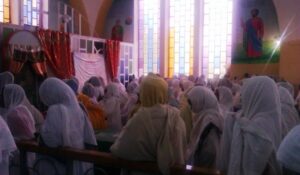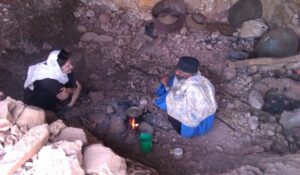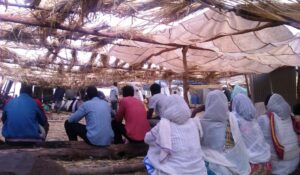Blog
Starting a research project during a pandemic and a war: lessons from project dldl/ድልድል
June 1, 2021
LIDC member Dr Romina Istratii is a UKRI Future Leaders Fellow at SOAS University of London. Here she describes the challenges of setting up project dldl/ድልድል (which means ‘bridge’ in Tigrigna), a project dedicated to the development and strengthening of religio-culturally sensitive, domestic violence alleviation systems in Ethiopia, Eritrea and the UK. This blog was produced with contributions from Ms Estela Papagianni, Project Manager; Ms Mebrak Ghebreweldi, Coordinator and Research facilitator Eritrea, Director/founder Diversity Resources International (UK); Mr Aklil Damtew, Project Activities Coordinator at EOC DICAC, Ethiopia
In 2020, we received a UKRI Future Leaders Fellowship (FLF) award to implement a research and innovation project dedicated to the development and strengthening of religio-culturally sensitive, domestic violence alleviation systems in Ethiopia, Eritrea and the UK. This has now become project dldl/ድልድል, which means ‘bridge’ in Tigrigna, reflecting the project’s aim of bridging different disciplines, sectors and stakeholders in order to achieve a more reflexive, decolonial and integrated approach to domestic violence in diverse religious communities.
The project is dedicated to generating new research around the ways in which religious beliefs, theology and the clergy can contribute to the deterrence of domestic violence, and to raising awareness about the religio-cultural parameters of domestic violence among practitioners within the project countries and those working with the respective migrant communities in the UK.
 The project was envisioned as an impact-oriented endeavour to apply research-based evidence to the resolution of an urgent societal issue. It also sought to reverse historical asymmetries in knowledge production within international development by fostering Southern-Northern knowledge exchange and genuine collaboration. Informed by the PI’s decade-long experience working as a decolonial researcher and practitioner in rural communities of Africa and critical conversations with colleagues in the project countries, the project envisioned to develop and implement meaningful and impactful interventions led by empirical evidence and real-life experiences to ensure their relevance to specific contexts and communities and their integration in existing infrastructures and systems, avoiding duplication.
The project was envisioned as an impact-oriented endeavour to apply research-based evidence to the resolution of an urgent societal issue. It also sought to reverse historical asymmetries in knowledge production within international development by fostering Southern-Northern knowledge exchange and genuine collaboration. Informed by the PI’s decade-long experience working as a decolonial researcher and practitioner in rural communities of Africa and critical conversations with colleagues in the project countries, the project envisioned to develop and implement meaningful and impactful interventions led by empirical evidence and real-life experiences to ensure their relevance to specific contexts and communities and their integration in existing infrastructures and systems, avoiding duplication.
Recognising the limitations of our detached or deeply involved positionalities in the project countries (some of us being foreigners or members of the diaspora community, while some being based in these societies and deeply emboldened in local socio-cultural and political realities), we understood well that such locally-grounded and integrated approaches can only be achieved with the support of partners, community led-organisation and the trust of religious and secular stakeholders. We also placed emphasis on diverse specialisations in the project countries and the cultural-bilingual awareness of team members, researchers and practitioners. This also explains the PI’s commitment to living and working in the project countries.
The three-fold challenge of setting up such a project
The grant carried the promise of enabling us to implement a project many years in the making developed on the basis of the PI’s previous long-term ethnographic research in the countryside of Ethiopia, extensive efforts to build trust with communities and an understanding of a common vision with colleagues, new prospective partners and other stakeholders in the three countries.
Given the extensive efforts to develop the project proposal, we anticipated the hard work that would be needed to set up such an ambitious project – a £1.2 million project involving 6 (now 7) partners and collaborators and activities in 3 project countries – especially during a nation-wide financial crisis affecting universities and leading to significant cuts in human resources, including at SOAS. The pandemic created additional and unexpected challenges as mobility became significantly curtailed and posed new constraints for research and its applications in society. What we did not anticipate was an important third challenge: a sudden war that erupted in the Tigray region in Northern Ethiopia, just as we were ready to travel there in late 2020. The research that guided the development of this project had taken place in the countryside around Aksum city, located in Tigray region, where the project proposed to pilot an intervention with clergy and to build further understanding of domestic violence through research with men.
Facing multiple challenges
The first month of project work was dedicated to trying to navigate and understand internal procedures at our institution; writing partner collaboration agreements, agreeing terms of work going through the institutional process to obtain the necessary approvals. On the other hand, partners in Ethiopia, where the first activities were planned to start, needed to be provided with explanations around the rationale behind SOAS processes, regulations and policies and this required further discussion to negotiate tensions and to decipher and explain differences across national, institutional, legal or other frameworks.
In Ethiopia, the project was launched just as the war erupted in our original project sites in Tigray region. At the outset of the war, all communications with the region were interrupted, which made it impossible to continue work. Beyond the constant concern for the wellbeing of our colleagues in Tigray, it was disappointing that we would not be able to create the jobs and research opportunities for numerous researchers, instructors and students at the partner institutions, some of whom had been extremely supportive with the application and conducive to its success. In parallel, we needed to restructure the project’s first work package and to shift activities to a region of Ethiopia not affected by conflict, ensuring that the work was still methodologically sound and relevant to the evidence produced in previous years in Northern Ethiopia. This required seeking a new collaborating organisation, who would be able to support the activities in the new locality. Moreover, government priorities and extensive processes made it very difficult and time-consuming to navigate bureaucratic hurdles to obtain for the PI the necessary permit for long-term work and stay in the country.
The start of activities in Eritrea was challenged by the pandemic, with commercial flights being ceased and entry in the country becoming infeasible. This created new hurdles in maintaining communication within existing advisers to the project, fostering relationships of trust with Eritrean stakeholders, prospective partners and researchers and obtaining the necessary government and institutional approvals and support to proceed with research in the country. The importance of proceeding transparently and with the support of government, academic and civil society institutions in the project countries cannot be stressed enough and this was challenged the most by pandemic-related mobility restrictions.
Adapting and innovating without distorting the vision
 Our commitment to prioritise research and learning in Ethiopia and Eritrea and to apply this evidence to inform international and UK debates and approaches made it difficult to reverse the work packages we had planned, which were sequential – moving from Ethiopia to Eritrea to the UK. The project was also envisioned to comprise of interventions in the project countries and other collaborative initiatives, which required the PI’s long-term stay in Ethiopia and frequent travel to Eritrea, as well as a degree of mobility across the other project countries for other project members.
Our commitment to prioritise research and learning in Ethiopia and Eritrea and to apply this evidence to inform international and UK debates and approaches made it difficult to reverse the work packages we had planned, which were sequential – moving from Ethiopia to Eritrea to the UK. The project was also envisioned to comprise of interventions in the project countries and other collaborative initiatives, which required the PI’s long-term stay in Ethiopia and frequent travel to Eritrea, as well as a degree of mobility across the other project countries for other project members.
In view of COVID-19-related constraints, a conscious effort was made to implement activities that could be completed through the Internet and were not bound geographically. In the initial five months of the project, we have thus succeeded to publish the project website, which aims to facilitate the impact strategy of the project by creating a dissemination and knowledge-exchange platform that brings together the different stakeholder groups of this project. We also sought to leverage on knowledge exchange opportunities, organising international webinars to disseminate the project’s works and setting up an open discussion group on domestic violence, gender and faith to promote cross-sectoral learning and connections.
 In Ethiopia, we have done our best to adapt the project by delaying research activities (in view of war-related risks) and by successfully shifting one of the intervention activities to another locality. In parallel, we have tried to integrate with current SGBV responses in Tigray and to inform the humanitarian efforts there to the best of our ability, such as by conducting a rapid scoping literature review on war violence and domestic violence that can inform the provision of psychosocial services on the ground (see our list of Outputs). In Eritrea, on the other hand, we have tried to build connections through phone, email, the Internet and other means and to reach out to members of the Eritrean diaspora in the UK in order to develop a pool of specialists that can be involved in our knowledge exchange activities.
In Ethiopia, we have done our best to adapt the project by delaying research activities (in view of war-related risks) and by successfully shifting one of the intervention activities to another locality. In parallel, we have tried to integrate with current SGBV responses in Tigray and to inform the humanitarian efforts there to the best of our ability, such as by conducting a rapid scoping literature review on war violence and domestic violence that can inform the provision of psychosocial services on the ground (see our list of Outputs). In Eritrea, on the other hand, we have tried to build connections through phone, email, the Internet and other means and to reach out to members of the Eritrean diaspora in the UK in order to develop a pool of specialists that can be involved in our knowledge exchange activities.
We are still adapting as we continue to explore wisely and thoughtfully possibilities and opportunities in consultation with our partners, project mentors, co-investigators and the project’s dedicated Advisory Board. We feel fortunate that this project is funded by the UKRI’s FLF scheme, which precisely seeks to facilitate and accommodate cross-sectoral projects that have the ability to adapt timely and in enterprising ways to changing societal conditions. We are not certain how exactly this project will evolve in the coming years, but we feel reassured by the funder’s understanding of the need for flexibility if we sincerely commit to the aim of achieving impactful interventions meaningful to real people in real time.
If you are interested in reading more about project dldl/ድልድል, please visit the official website of the project: https://projectdldl.org/

